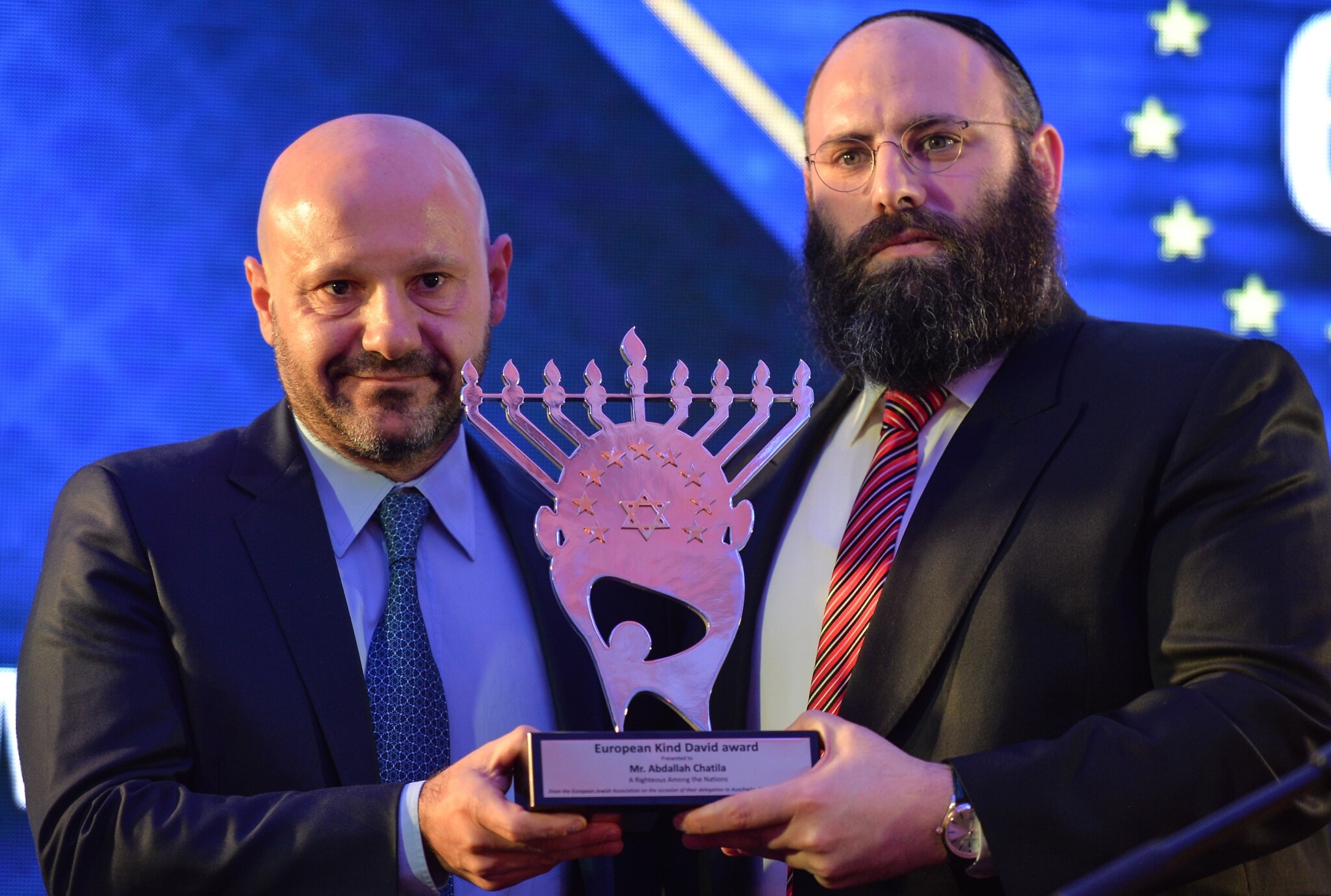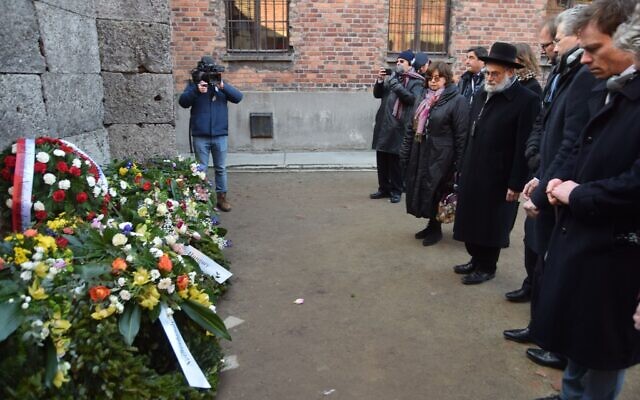Over 100 European parliamentarians visit Auschwitz-Birkenau
Survivors, ministers, community leaders and diplomats flew to Poland on Monday to pay their respects to victims and lay wreaths at the German Nazi death camp
Poland, Krakow – Over 100 European parliamentarians gathered in Krakow this week to visit Auschwitz-Birkenau ahead of the 75th anniversary of the liberation of the German Nazi death camp.
Survivors, ministers, community leaders and diplomats flew to Poland on Monday to pay their respects to victims and lay wreaths at the camp’s Death Wall where thousands of prisoners were executed.
The two-day trip, organised by the European Jewish Association (EJA) and the European Action and Protection League (APL), included a conference on tackling antisemitism and a dinner gala, followed by a visit to Auschwitz-Birkenau and a memorial service.
Delegates included the European Parliament’s former president Antonio Tajani, its current vice-president Mairead McGuinness, the Flemish minister-president Jan Jambon and Hungarian justice minister Judit Varga.
Speaking at the memorial service were the Polish-born French author and survivor of the Warsaw ghetto Marek Halter, and the former Israeli chief rabbi Yisrael Meir Lau, himself a child survivor of Buchenwald, who said kaddish to commemorate the 6 million Jews murdered in the Holocaust.

Parliamentarians were urged to introduce tougher laws to tackle antisemitism. Draft legislation sent to delegates ahead of the trip suggested penalties against the public use of antisemitic stereotypes, increased funding to bolster Holocaust education and a ban on the sale of Nazi memorabilia for profit or out of a “macabre interest.”
Rabbi Menahem Margolin, founder and chair of EJA, called on delegates to return to their respective parliaments bearing the proposals – not just “the image of hell” that is Auschwitz-Birkenau.
“You are leaders and people look up to you and follow your example, and therefore this is in your hands. Our future. Your future is in your hands. And you can make this a very important and positive change,” he told delegates.

In video messages played at the dinner gala, Israeli Prime Minister Benjamin Netanyahu and Benjamin Gantz, the leader of the Blue and White party, both warned against growing anti-Jewish racism.
The Polish president Andrzej Duda addressed delegates in a letter about Holocaust remembrance read aloud at the gala by presidential minister Wojciech Kolarski. “The German occupiers sought to break both personal solidarity and brotherhood ties between the Poles and the Jews,” Duda wrote, before praising the “numerous Poles” who “despite threatening repression, tried to save Jews and many of them died together with the rescued.”
Other speakers included Yonatatan Langer, a former neo-Nazi turned activist who later converted to Judaism, and Abdallah Chatila, a Lebanese businessman who bought auctioned Nazi memorabilia to donate to Yad Vashem, who received the King David Award at the event.

Guest speaker Keren Knoll, the Israel-based granddaughter of the late Mireille, an 85-year-old Holocaust survivor murdered in her flat in Paris in 2018, delivered an emotional plea to the delegation to take a stand against antisemitism. “Antisemites live among us. Hate is still very alive,” she warned delegates.
Flying in from the UK were the Tory MSP Jeremy Balfour and the Welsh Conservative Party Assembly Member and shadow Welsh language minister Suzy Davies.
Balfour, who previously visited Auschwitz-Birkenau with his wife, said: “Coming to Auschwitz with a community, particularly with a lot of people who are Jewish themselves, in some ways makes it far more symbolic and emotional than if you just come by yourself.
“You can’t help but think ‘how would our generation react to such an event, what happened’, and yet we have to be aware that it could happen again and have to fight what we need to be fighting against.”
Balfour hopes to contribute to a debate in the Scottish Parliament next week marking the 75th anniversary of the liberation of Auschwitz.
Speaking to Jewish News after visiting Auschwitz-Birkenau for the first time, Davies said she was struck by the piles of hair cut from the heads of victims, now displayed in a glass case at the memorial site in an exhibition containing evidence of crimes.
“The strange thing was to be going there on a bright sunny day and actually looking at photographs as we went around, and [seeing] the horrors also happening in bright sunny days,” Davies said.
Visiting Auschwitz-Birkenau, she said, can make the lessons of the Holocaust more “visceral” to parliamentarians. “We’ve got leaders from various parliaments in Europe.They’re all extremely busy. When they go in tomorrow, there’ll be 55 other things at the top of the inbox for them,” she said.
“By visiting it, it stays with you viscerally somehow. And that helps you remember the message that you’re trying to convey to the people, who’ve got more power than me, to try and make, not only the memory last, but make sure that we put things in place with, even if it is as much as legislation to make sure it doesn’t happen again, and specifically with antisemitism, we still feel determined after a visit like this,” she added.

Thank you for helping to make Jewish News the leading source of news and opinion for the UK Jewish community. Today we're asking for your invaluable help to continue putting our community first in everything we do.
For as little as £5 a month you can help sustain the vital work we do in celebrating and standing up for Jewish life in Britain.
Jewish News holds our community together and keeps us connected. Like a synagogue, it’s where people turn to feel part of something bigger. It also proudly shows the rest of Britain the vibrancy and rich culture of modern Jewish life.
You can make a quick and easy one-off or monthly contribution of £5, £10, £20 or any other sum you’re comfortable with.
100% of your donation will help us continue celebrating our community, in all its dynamic diversity...
Engaging
Being a community platform means so much more than producing a newspaper and website. One of our proudest roles is media partnering with our invaluable charities to amplify the outstanding work they do to help us all.
Celebrating
There’s no shortage of oys in the world but Jewish News takes every opportunity to celebrate the joys too, through projects like Night of Heroes, 40 Under 40 and other compelling countdowns that make the community kvell with pride.
Pioneering
In the first collaboration between media outlets from different faiths, Jewish News worked with British Muslim TV and Church Times to produce a list of young activists leading the way on interfaith understanding.
Campaigning
Royal Mail issued a stamp honouring Holocaust hero Sir Nicholas Winton after a Jewish News campaign attracted more than 100,000 backers. Jewish Newsalso produces special editions of the paper highlighting pressing issues including mental health and Holocaust remembrance.
Easy access
In an age when news is readily accessible, Jewish News provides high-quality content free online and offline, removing any financial barriers to connecting people.
Voice of our community to wider society
The Jewish News team regularly appears on TV, radio and on the pages of the national press to comment on stories about the Jewish community. Easy access to the paper on the streets of London also means Jewish News provides an invaluable window into the community for the country at large.
We hope you agree all this is worth preserving.






















